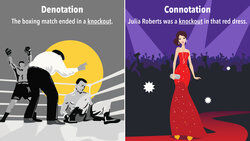

Has anyone ever asked you if you "catch their meaning"? If so, they were probably using a connotation. Denotation is more of a literal meaning. To keep them straight, learn the difference between connotation vs. denotation through definitions and examples.
Denotation is the literal meaning of a word. For example, take the word "vintage." By its very definition, when you say that something is vintage, it means that it was made a long time ago. Perhaps your friend's dad drives a vintage Corvette. That's denotation.
Connotation, on the other hand, is an indirect or implied meaning or feeling. Take the word "vintage" again. It has a separate connotation.
A lot of women love to shop for vintage clothing. That doesn't mean they're looking for something simply made a long time ago. In fact, popular brands make "vintage" clothing every day. It just means it's an old style that's making a comeback, such as headscarves or Mary Jane shoes. The word carries a nostalgic, desirable quality.
Still confused? Take a closer look at how connotation and denotation differ with an explanation and examples.
Here's another way to look at it. Denotation is the standard definition of a word, whereas connotation is the feeling evoked by a word. Let's consider another word: gritty.
The definition of gritty is "having a rough texture." So, in a literal sense (denotation), we might say:
This sandpaper is gritty. It'll make that countertop nice and smooth.
But, consider this sentence:
That side of town is pretty gritty.
In that sense, we're not saying that section of the city has a "rough texture" in a literal sense. Instead, we're saying it's a tough neighborhood, perhaps with issues related to crime and poverty. As such, you'll want to have your wits about you when walking through its streets. That's connotation.
AdvertisementNow that you know the difference between the meanings of connotation vs. denotation, check out these examples of how you can use the same word in a denotative and connotative way.
The second sentence suggests that the t-shirt wasn't just a bargain buy. Rather, it was of poor quality. The implication is that a higher-quality garment wouldn't have pilled.
When someone says you should never dabble in drugs (or anything harmful), they mean you shouldn't touch them, never mind a superficial interest or momentary experimentation. The connotation of "dabbling in drugs" is to "stay back." Don't even go there.